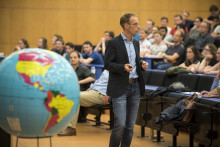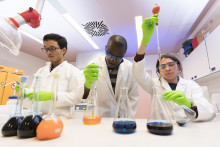What does the BANX project involve?
Roos: 'In the project, we will develop computer models and data analysis techniques to better detect and understand the consequences of large-scale marine sand extraction in areas with sand scarcity. The focus here is on the North Sea, specifically the sandbanks off the coast of Belgium and Zeeland, because sand scarcity is already manifesting itself there.'
Why is sand mining research important?
'The demand for sand is rising and will continue to rise in the coming years, partly due to a growing world population, rising living standards worldwide and climate change. The UN has now recognised that this scarcity is an emerging crisis on a global scale. This is partly why it is very important to know more about it. When we talk about crises on a global scale, we often think of climate and water, but sand has received less attention. That is fortunately changing because of the UN recognition.'
What are the implications of large-scale sand extraction from the sea?
'Sand extraction from the sea is attractive in principle. We need sand for coastal defences in response to sea level rise, reclaiming sand for land reclamation - think of the port expansion Maasvlakte 2 - and also for building houses and infrastructure. But supplies are limited and extracting large quantities of sand from sandbanks means a huge intervention in a complex and dynamic system. An intervention that affects sea currents, sediment movement and thus also the long-term development of the seabed itself. Marine sand extraction also impacts directly and indirectly on ecology and coastal safety. Within BANX, we aim to better understand this. Not only to be able to predict, but also to design sand extraction more efficiently.'
What makes this project special?
'The international collaboration. This is uncommon in an NWO grant, but we could clearly demonstrate that the Belgian contribution in this is unique and complementary to ours. The fact that we are conducting the project together with RBINS (Royal Belgian Institute of Natural Sciences, ed.), Ghent University and users from both the Netherlands and Belgium makes it interesting. And so is the involvement of UNEP, the United Nations environment programme.'
What will the project look like in the coming years?
'We hope to start next summer, with a PhD student here at UT and also one in Belgium. With the UT team, we will focus mainly on developing a model and making simulations, while the Belgian partners will focus on data analysis from a geological and sedimentological perspective. Further on in the project, a postdoc will work on the implementation.'
And what is the goal? Where do you hope to be with BANX in five years' time?
'I think the most important thing is that the two PhD candidates are successful. After all, the grant is for scientific research. I also hope that the tool to be delivered - which gives insight into the consequences of large-scale sand extraction - will actually be used in practice. And collaborating with Belgian colleagues plus the fact that we are on UN's radar is, of course, a nice side-catch.'






